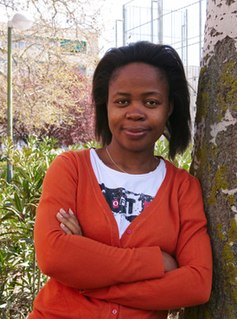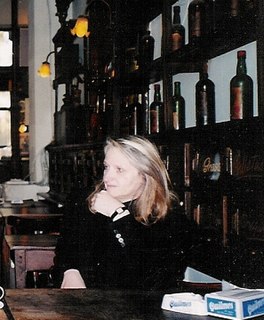Related Research Articles

Florencia Trinidad, better known by her stage name Flor de la V, is an Argentine actress, television personality, comedian and vedette. As producer Gerardo Sofovich's protégée, who discovered her in a 1998 revue in Buenos Aires, Trinidad gained media exposure and got small television roles. Her role in the widely successful Los Roldán gave her international notoriety. Over the years, Trinidad has become a household name in Argentine show business.

The status of women in Argentina has changed significantly following the return of democracy in 1983; and they have attained a relatively high level of equality. In the Global Gender Gap Report prepared by the World Economic Forum in 2009, Argentine women ranked 24th among 134 countries studied in terms of their access to resources and opportunities relative to men. They enjoy comparable levels of education, and somewhat higher school enrollment ratios than their male counterparts. They are well integrated in the nation's cultural and intellectual life, though less so in the nation's economy. Their economic clout in relation to men is higher than in most Latin American countries, however, and numerous Argentine women hold top posts in the Argentine corporate world; among the best known are Cris Morena, owner of the television production company by the same name, María Amalia Lacroze de Fortabat, former CEO and majority stakeholder of Loma Negra, the nation's largest cement manufacturer, and Ernestina Herrera de Noble, director of Grupo Clarín, the premier media group in Argentina.

Ana María Shua is an Argentine writer. She is particularly well known for her work in microfiction.

Nuria Oliver is a computer scientist. She is Chief Scientific Adviser at the Vodafone Institute, Chief Data Scientist at DataPop Alliance, an independent director on the board of directors of Bankia, and Commissioner of the Presidency of Valencia for AI and COVID-19. Previously, she was Director of Data Science Research at Vodafone, Scientific Director at Telefónica and researcher at Microsoft Research. She holds a PhD from the Media Lab at MIT, and is an IEEE Fellow, ACM Fellow, a member of the board of ELLIS, and elected permanent member of the Royal Academy of Engineering of Spain. She is one of the most cited female computer scientists in Spain, with her research having been cited by more than 17,000 publications. She is well known for her work in computational models of human behavior, human computer-interaction, mobile computing and big data for social good.
Terrorism in Argentina has occurred since at least the 1970s specially during the Argentinian Dirty War where a number of terror acts occurred, with support of both the democratic government of Juan Domingo Perón, Isabel Martínez de Perón and the following de facto government of the National Reorganization Process. In the 1990s, two major terrorist attacks occurred in Buenos Aires, which together caused 115 deaths and left at least 555 injured.
Feminism in Argentina is a set of movements aimed at defining, establishing, and defending equal political, economic, and social rights and equal opportunities for women in Argentina. Although some women have been considered precursors—among them Juana Manso and Juana Manuela Gorriti—feminism was introduced to the country as a result of the great European immigration wave that took place in the late 19th and early 20th century. The first feminists did not form a unified movement, but included anarchist and socialist activists, who incorporated women's issues into their revolutionary program, and prestigious freethinker women, who initially fought for access to higher education and, later, legal equality with men. Despite the efforts of the first-wave feminists, Argentine women did not acquire the right to vote until 1947, during Juan Perón's first government. His highly popular wife, Eva, championed women's suffrage and founded and ran the nation's first large-scale female political party, the Female Peronist Party. Although she refused to identify herself as a feminist, Eva Perón is valued for having redefined the role of women in politics.

Django Girls is an international non-profit organization started by two Polish women, Ola Sitarska and Ola Sendecka, to inspire women from all backgrounds to get interested in technology and to become programmers, offering a safe and friendly environment. It is known for the free workshops it hosts to help women to learn to program and for its Django tutorial. It is often supported by the Python Software Foundation, and they often hold sessions at the Python Conference.
Andrea Grobocopatel is an Argentine economist and founding member of Los Grobo, a leading Argentine agronomic company in South America.
Mónica Cabrera is an Argentine director, playwright, and actress of film, television, and theater. Among other films, she has appeared in Son of the Bride (2001), Lost Embrace (2004), and El infinito sin estrellas (2007). On television she acted in Tratame bien (2009), Malparida (2010), and La dueña (2012).

Rita Laura Segato is an Argentine-Brazilian academic, who has been called "one of Latin America's most celebrated feminist anthropologists" and "one of the most lucid feminist thinkers of this era". She is specially known for her research oriented towards gender in indigenous villages and Latin American communities, violence against women and the relationships between gender, racism and colonialism. One of her specialist areas is the study of gender violence.

Otto Ramón Sonnenholzner Sper is an Ecuadorian radio broadcaster, politician, and economist who served as the 50th Vice President of Ecuador.
The Frente de Todos is a coalition of Peronist, Kirchnerist, left-wing and communist political parties in Argentina formed to support Alberto Fernández and Cristina Fernández in the 2019 general election.

Trifonia Melibea Obono is a novelist, political scientist, academic and LGBTQI+ activist. Her novel La Bastarda is the first novel by a female Equatorial Guinean writer to be translated into English.
Justicia Acuña (1893-1980) was a Chilean engineer. She was the first woman with this profession in her country and in South America.

Karina Pankievich is a Uruguayan trans rights activist. She is the president of Asociación Trans del Uruguay (ATRU).

Gypsy feminism or Romani feminism is the feminist trend that promotes gender equality, the fight against social inequalities and the defense of the integration of women in different movements in society, making these processes compatible with the preservation of culture and values of the Romani people.

Elizabeth Gómez Alcorta is an Argentine lawyer, professor and politician, currently serving as Minister of Women, Genders and Diversity since 10 December 2019. She is the first person to hold that office.

Diana Raznovich in an Argentine playwright and cartoonist. Her work in both mediums is comedic in tone and deals with feminism, sexuality, and Argentina's military dictatorship.
References
- 1 2 3 Kopf, Dan. "How R-Ladies made data science inclusive". Quartz at Work. Retrieved 2020-03-11.
- ↑ "Resources For Women In Data Science and Machine Learning". KDnuggets. Retrieved 2020-03-11.
- ↑ J, Pablo (2019-08-17). "Mujeres en la programación ¿Cual es la expectativa de mercado?". Puro-Geek (in Spanish). Retrieved 2020-03-11.
- ↑ Chan, Rosalie. "This IBM manager moved from Brazil, learned to code, and now leads a worldwide organization to teach women how to be data scientists". Business Insider. Retrieved 2020-03-11.
- ↑ "[Annual Party 周年慶] R-Laides兩歲了 Celebration for 2-years-old". Meetup (in Spanish). Retrieved 2020-03-11.
- ↑ "First Organizing R-Ladies Meeting!". Meetup (in Spanish). Retrieved 2020-03-11.
- ↑ "Royal Statistical Society Publications". Significance. 15 (4). August 2018. doi: 10.1111/sign.2018.15.issue-4 . ISSN 1740-9705.
- 1 2 "About us – R-Ladies Global" . Retrieved 2020-03-11.
- ↑ rladies/global, R-Ladies Global, 2018-04-24, retrieved 2020-03-11
- ↑ Mertic, John (2018-03-27). "R Consortium welcomes R-Ladies as a top level project". R Consortium. Retrieved 2020-03-11.
- ↑ "R-Ladies". gqueiroz.shinyapps.io. Retrieved 2020-03-11.
- 1 2 "Conoce R-Ladies CDMX, el proyecto donde mujeres enseñan a programar a mujeres". malvestida.com. 20 April 2018. Retrieved 2020-03-11.
- ↑ rladies/starter-kit, R-Ladies Global, 2020-03-07, retrieved 2020-03-11
- ↑ Rosenberg, Joshua; Lawson, Michael; Anderson, Daniel; Jones, Ryan Seth; Rutherford, Teomara (2019-09-13). "Making Data Science Count In and For Education". doi:10.35542/osf.io/hc2dw.Cite journal requires
|journal=(help) - ↑ contributor, Roberto Torres / (2018-01-03). "The R community is doing really well in gender diversity". Technical.ly Philly. Retrieved 2020-03-11.
- ↑ Clarín.com. "De la economía a la programación, en un abrir y cerrar de ojos". www.clarin.com (in Spanish). Retrieved 2020-03-11.
- ↑ Bueno, Montse Hidalgo Pérez, Olivia López (2018-09-07). "La calculadora mágica de los científicos de datos cumple 25 años". EL PAÍS RETINA (in Spanish). Retrieved 2020-03-11.
- ↑ "A Multimillion-Dollar Startup Tried To Cover Up Its CEO's Sexual Misconduct. Then The Truth Came Out". BuzzFeed News. Retrieved 2020-03-11.
- ↑ Thieme, Nick (2018). "R generation". Significance. 15 (4): 14–19. doi: 10.1111/j.1740-9713.2018.01169.x . ISSN 1740-9713.
- ↑ Sánchez, Cristina. "Las ingenieras que luchan para que la inteligencia artificial tenga 'madres'". eldiario.es (in Spanish). Retrieved 2020-03-11.
- ↑ "Marcela, programando la igualdad de género". Testigo Púrpura (in Spanish). 2019-10-08. Retrieved 2020-03-11.
- ↑ Sánchez, Cristina. "Las ingenieras que luchan para que la inteligencia artificial tenga 'madres'". eldiario.es (in Spanish). Retrieved 2020-03-11.
- ↑ "Hay que perder ese miedo irracional a las matemáticas". Innovando - La Rioja (in Spanish). 2019-04-03. Retrieved 2020-03-11.
- ↑ Herranz, Arantxa (2018-05-28). "Reciclé mi vida profesional por completo haciendo cursos gratuitos de Coursera sobre data science". Xataka (in Spanish). Retrieved 2020-03-11.
- ↑ Clarín.com. "De la economía a la programación, en un abrir y cerrar de ojos". www.clarin.com (in Spanish). Retrieved 2020-03-11.
